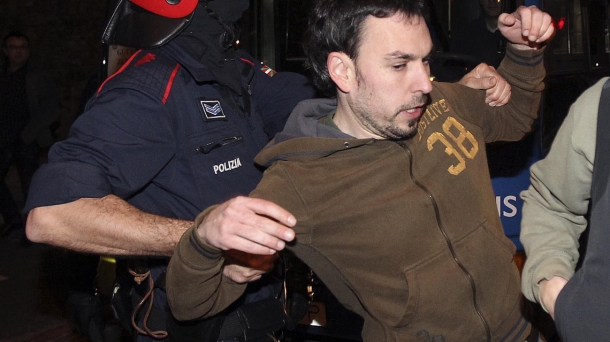news
Spain
More than fifty people arrested in the early stage of the strike
News Agencies
Unions are challenging a conservative government just a day before it is set to serve up more austerity pain to try to shake up a labour market long regarded as among Europe's most rigid.
-

Basque police arrested four people in Vitoria-Gasteiz. Photo: EFE
Angry workers formed boisterous picket lines outside wholesale markets, some TV stations went off the air and car factories were all but idled in the early stage of a general strike Thursday.
Unions are challenging a conservative government not yet 100 days old just a day before it is set to serve up more austerity pain to try to shake up a labour market long regarded as among Europe's most rigid.
Thursday's stoppage is called to protest changes to labour market rules. The piece of legislation, among other things, makes it cheaper and easier for companies to: lay people off, cut wages and modify other working conditions just by citing concerns over, for example, productivity.
The Interior Ministry said a total of 58 people were detained and nine were injured in scuffles as Thursday's strike got underway a minute after midnight.
At Madrid's Central Market, union members gathered to protest and try to block trucks crossing the picket line and in the city centre different groups of union members marched through the streets.
They also attempted to close some stores that remained opened, putting stickers reading
"Closed. 29 March General Strike" in the ones already closed.
More austerity pain
Thursday's stoppage, called to protest changes to labour market rules long regarded as among Europe's most rigid, comes just a day before the government will serve up even more austerity pain.
A budget expected on Friday is set to feature tens of (b) billions of euros (dollars) in deficit-reduction measures.
The jobless rate is now nearly 23 percent, a eurozone high, and nearly 50 percent among young people.
top stories



-
news
New anti-eviction law
Andalucia begins proceedings to seize confiscated houses from banks
-
news
London attack
British police ponder conspiracy after soldier murder
-
Sport
Giro d'Italia
Nibali tightens grip on overall lead after stage victory
© EITB - 2024 - Privacy Policy - Legal disclaimer - Cookie Policy - Cookie settings


